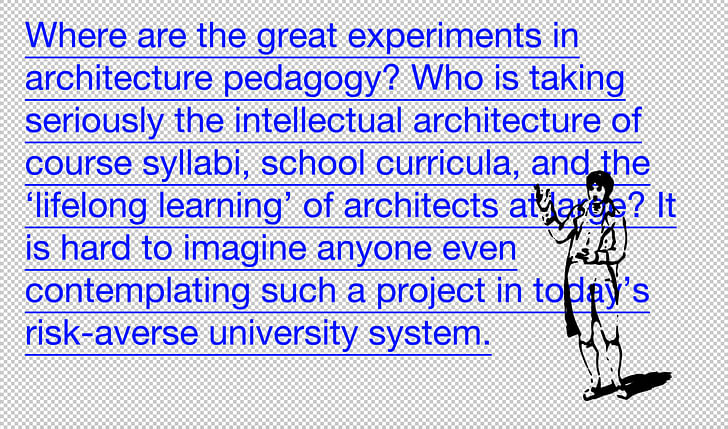

Not so long ago, not everyone would be expected to graduate from high school. (Graduation rates in the US: 1900: 6%; 1930: 55%; 2016: 83%.) Now college is more or less mandatory in many lines of work, and an advanced degree is almost a requirement to be an architect. But somehow an old idea persists: the idea of the architect as a generalist problem-solver, a gentleman amateur. This is a nineteenth century idea that fit, say, Frank Lloyd Wright, but, strangely enough, it also fits most contemporary architects that come to mind.
So some architects are stuck in the past — maybe that’s not a surprise. The really strange thing, though, is that even architecture theory today is compatible with this old-fashioned notion. Theorists assume that architects will not go deeply into ideas — they will only skim the surface for the catchiest bits. They figure that architects want and need operative theory, perhaps with a dash of difficulty to remind them that they don’t know everything. The education of architects does not take into consideration the real advances in the character and quantity of knowledge in the past century. Consider the graph of the exponential increase in energy-expenditure per capita below, and consider the fact that a lot of this energy has gone into academic specialization and knowledge-building. Think of the flood of scholarly monographs being written today. Imagine: in the mid-twentieth century, the last vestiges of naïve positivism were finally being demolished in every discipline; today I can open the Stanford Encyclopedia of Philosophy on my cell phone and pull together a dozen genealogies of post-neo-positivism in an afternoon.
We ought to be skeptical of the notion that we are in an era of unprecedented information overload; people have been saying as much for centuries. But it is worth taking a minute to speculate about what it would mean for architecture if it were true. Courses in architecture theory are too often designed as isolated exercises. Contemporary theory is not being taken on seriously as a pedagogical problem that requires careful staging. If knowledge really is piling higher, we need to dig deeper and more carefully to get to the complicated heart of an issue. We may run out of time. Say we really want to understand the philosophy of Gilles Deleuze, for some reason. Several conceptual pieces (Marx, semiotics, Freud, vitalism) would need to be put in place before we even got to the 1960s. Each of these preliminary pieces is obsolete — they would only be taught as stepping-stones to more complex ideas — but each of them would require a semester to really work through.
We need neither anarchists nor authoritarian system-builders, but great tacticians who can get to work with a diagram of global disciplinary mechanics in mind
Approaching architecture theory in our era of specialized, nuanced knowledge would thus take a level of commitment and coordination that is now lacking. Where are the great experiments in architecture pedagogy? Who is taking seriously the intellectual architecture of course syllabi, school curricula, and the ‘lifelong learning’ of architects at large? We have seen the dark magic worked by Cambridge Analytica to sway voters in last election —can we use some of this for the good of architecture? It is hard to imagine anyone even contemplating such a project in today’s risk-averse university system. I take heart in the fact that architecture schools are more autonomous from the pressures of neoliberal academia than most other schools. Experimental institutions like the Free School of Architecture might spark some openness, competition, and innovation in the arena of pedagogical models. But our first task is to imagine teaching as something other than a mercenary enterprise: the lone professor darting in to teach a studio or seminar on his/her pet project. We need neither anarchists nor authoritarian system-builders, but great tacticians who can get to work with a diagram of global disciplinary mechanics in mind.
Cross-Talk is a new recurring series on Archinect that endeavors to bring architectural polemics and debate up-to-date and up-to-speed with the pace of cultural production today. Each installation will feature four responses by four writers to a single topic. For this week's iteration, the topic is 'pedagogy'.
Matthew Allen is a PhD candidate at Harvard University Graduate School of Design. He has an MArch from the GSD and degrees in physics and the comparative history of ideas, and he has worked previously in the video game and bioengineering industries. Allen is also a lecturer at the University of ...
No Comments
Block this user
Are you sure you want to block this user and hide all related comments throughout the site?
Archinect
This is your first comment on Archinect. Your comment will be visible once approved.